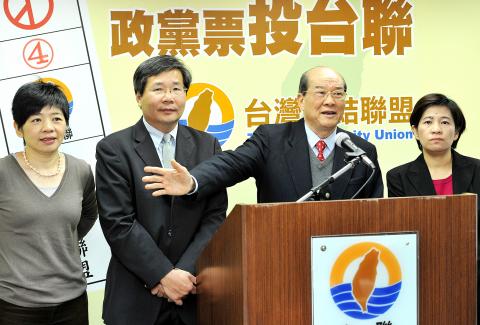The Taiwan Solidarity Union (TSU) yesterday introduced its three new legislators and reiterated its intention to work with its ally the Democratic Progressive Party (DPP) in the legislature.
TSU Chairman Huang Kun-huei (黃昆輝) introduced Hsu Chung-hsin (許忠信), Huang Wen-ling (黃文玲) and Lin Shih-chia (林世嘉), who will be sworn in on Feb. 1. The party garnered 1.17 million party votes in the elections on Saturday, passing the 5 percent threshold and winning three legislator at-large seats.
Huang Kun-huei urged the DPP not to get down on itself for losing the presidential election, saying that DPP presidential candidate Tsai Ing-wen (蔡英文) had fought a respectable war against the allied forces of the Chinese Nationalist Party (KMT), the Chinese Communist Party and Taiwanese tycoons who threatened the people against voting for her.

Photo: Chien Jung-feng, Taipei Times
Supporters of the pan-green camp should stay together and never hold their heads down, he said.
Huang Kun-huei said that Taiwan could enjoy healthy economic development even without closer trade and investment relations with China, citing the nation’s economic performance during former president Lee Teng-hui’s (李登輝) administration as evidence.
“The TSU insists on a Taiwan-centric economic policy,” he said.
The TSU made clear its intention to collaborate with the DPP in the elections when it endorsed Tsai for the presidential election. It only nominated 10 candidates for legislators-at-large and did not nominate any candidate to run in local districts.
The party received a surprisingly high support in the elections after Huang Kun-huei announced on the eve of the elections that the party would disband if it failed to surpass the 5 percent threshold.

Taiwanese can file complaints with the Tourism Administration to report travel agencies if their activities caused termination of a person’s citizenship, Mainland Affairs Council Minister Chiu Chui-cheng (邱垂正) said yesterday, after a podcaster highlighted a case in which a person’s citizenship was canceled for receiving a single-use Chinese passport to enter Russia. The council is aware of incidents in which people who signed up through Chinese travel agencies for tours of Russia were told they could obtain Russian visas and fast-track border clearance, Chiu told reporters on the sidelines of an event in Taipei. However, the travel agencies actually applied

Japanese footwear brand Onitsuka Tiger today issued a public apology and said it has suspended an employee amid allegations that the staff member discriminated against a Vietnamese customer at its Taipei 101 store. Posting on the social media platform Threads yesterday, a user said that an employee at the store said that “those shoes are very expensive” when her friend, who is a migrant worker from Vietnam, asked for assistance. The employee then ignored her until she asked again, to which she replied: "We don't have a size 37." The post had amassed nearly 26,000 likes and 916 comments as of this

New measures aimed at making Taiwan more attractive to foreign professionals came into effect this month, the National Development Council said yesterday. Among the changes, international students at Taiwanese universities would be able to work in Taiwan without a work permit in the two years after they graduate, explainer materials provided by the council said. In addition, foreign nationals who graduated from one of the world’s top 200 universities within the past five years can also apply for a two-year open work permit. Previously, those graduates would have needed to apply for a work permit using point-based criteria or have a Taiwanese company

The Shilin District Prosecutors’ Office yesterday indicted two Taiwanese and issued a wanted notice for Pete Liu (劉作虎), founder of Shenzhen-based smartphone manufacturer OnePlus Technology Co (萬普拉斯科技), for allegedly contravening the Act Governing Relations Between the People of the Taiwan Area and the Mainland Area (臺灣地區與大陸地區人民關係條例) by poaching 70 engineers in Taiwan. Liu allegedly traveled to Taiwan at the end of 2014 and met with a Taiwanese man surnamed Lin (林) to discuss establishing a mobile software research and development (R&D) team in Taiwan, prosecutors said. Without approval from the government, Lin, following Liu’s instructions, recruited more than 70 software